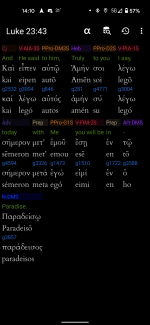Maybe both your compliments and insults are too quickly given.
You back up your assertion that the righteous dead go to Abraham's bosom by a statement that they go to a place with a different name, Paradise? How is that a proof of anything?
It's proof because the only reason that term exists in Christian doctrine is because Jesus Himself told one of the criminals hanging next to Him, "Assuredly, I say to you, today you will be with Me in Paradise.” (Luke 23:43)
That sounds like proof to me! How much more proof do you need?
You might consider whether the added commas and quote marks might be influencing your interpretation. Is it "I say to you, 'Today you will be with me in Paradise.'" Or is it "I say to you today, 'You will be with me in Paradise.'"
If you want to make an argument based on translation then make it but you will have to actually make the real argument where you present evidence that has nothing to do with your doctrine that makes the case that the reading that exists in every English bible that anyone has ever heard of before is incorrect. If you know of such an argument, please make it. I'd be interested in reading it.
And what form did Lazarus have in Abraham's bosom, if his body was still on earth? Does a soul have fingers? Did the rich man's soul have a tongue? Could he actually feel water if Lazarus had been able to bring it?
Why is it so difficult to imagine that a person could have fingers and a tongue and the ability to feel things without having a physical body? God spent an eternity without a physical form and yet was able to interact with other beings. How in the world could it have been possible for God to speak the universe into existence if He didn't have a physical tongue? Did God have no idea what different foods tasted like before the incarnation? Was the milk from Mary's breast the first thing God ever tasted? Angels came and not only talked but ate food with people several times in the Old Testament. Moses was shown God's back side. Etc. etc. etc.
You do not need to have a physical body of flesh to have a body.
I believe you and I are in agreement with the concept of open theism, which is so radical a departure from the accepted narrative of the churches here in our country that people have been called heretics for preaching it. Yet you and I and many others on this forum have resisted explanations on that topic that are much more heavily supported in scripture than the Abraham's bosom/paradise connection you've made.
All I know to say in response to this is that saying it doesn't make it so.
Jesus Himself states as plain as day that He and at least one other person would be in paradise by the end of the day. In addition to that, Jesus, while discussing the realities of our existence after physical death, refers to the place where the righteous dead go as "Abraham's bosom" or "Abraham's side" depending on the translation, indicating basically that the righteous dead go to the same place that Abraham went to when he died.
That is not in any sense a flimsy biblical foundation! You propose that the latter is useless because it was just a parable but Jesus wasn't telling that criminal on the cross a parable. On the contrary, He was making him a promise! A promise that is completely consistent with the parable that you blow off as worthless for no reason at all other than to maintain a doctrine that is contrary to it's teaching.
Are you willing to give the idea as much thought as open theism? You might just change your mind.
Not unless I find someone willing to do more than make the claim that I am wrong. I WANT to know where I'm wrong but am bereft of any actual argument in that direction.
If death is cessation of existence, the only thing you lose is the connection you've made. All else is pure narrative that obscures rather than exalts the power of God over , imho. We not need to redefine death for the bible's many scriptures referring to it to make sense. If death means complete cessation of life, God is able to completely restore us to life. His power is that great!
If death is the cessation of existence then no one has ever died nor will they this side of the Lake of Fire.
The problem there being that the bible calls the Lake of Fire "the SECOND death" (Revelation 20:14). It doesn't call it "death", it calls it "the second death".
If death is the cessation of existence then Adam did not die the day he ate of the Tree of the Knowledge of Good and Evil nor at any other time and not only would God have lied to Adam when He warned Adam and Eve not to eat of that tree but Romans 5 is also a lie (and therefore the whole rest of Paul's books which are predicated on that chapter).
In short, basically the whole of the Christian worldview falls into dust if death is defined as the cessation of existence.
And to get back to the thread topic, it doesn't do us any harm to consider the objections of non-trins, as long as we continue to learn and grow in the truths revealed in scripture.
Well, with that there can be no argument. In fact, folks who reject the Trinity are one of the few groups who are often both able and willing to make actual arguments for their doctrine. They are never convinced by the counter arguments but at least it takes some intellectual juice to debate them.


